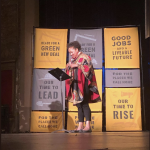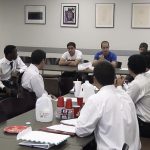In an office space in downtown Boston, a mother created an app for overworked moms. A victim of sexual assault made a database to quantify those crimes. The cousin of girl who lost her life to an eating disorder designed an app for rehabilitation.
And five women, some of whom had experienced painful sex themselves, approached the taboo topic to create SexWell, the winning app at Ovia Health’s “Technology Supporting Women” hackathon, which took place last Friday and Saturday at the company’s headquarters in Downtown Crossing.
Ovia Health is a women’s health company working to “improve the lives of women and families,” said Nicole Felch, event co-organizer and Android engineer at Ovia Health.
The founders of Ovia Health, college friends and hackathon buddies, have developed multiple apps to help with women’s health challenges, including fertility, pregnancy and parenting.
Now, they are turning to the general public for new innovation.
“We challenge you to solve a problem facing women today using technology,” Ovia Health said in their event description. “Help us make the world a better place for women and families!”
Friday evening, attendees filled up the sold-out event, congregating for a meet-and-greet before beginning the hack. Among the chatter, coders and designers exchanged ideas, pairing themselves off into teams.
“Most of the teams were people that didn’t know each other beforehand,” said Rory O’Connor, co-founder and vice president of engineering at Ovia Health.
SexWell, created by Rachel Hanebutt, Phoebe Wong, Leah Bellman, Helen Bresler and Kala Campbell, won first prize at the hackathon.
“There was a pitch period when everyone voiced their ideas and inspirations. That’s when our team developed,” said Bellman, an occupational therapist.
The app focused on tackling the problem of painful sex, working to raise public and patient awareness about pelvic floor therapy. “The field of women’s health is a very under recognized and underserved and includes a set of conditions that are very undiagnosed,” Bellman said.
“Students don’t study sexual physical therapy in medical school,” said Hanebutt, team member and co-founder of Confi, a crowdsourcing site dedicated to women’s sexual health.
Due to the taboo nature of painful sex, “intimacy does not get a lot of attention when it comes to medical treatments and therapies,” Bellman said.
Her teammate Helen Bresler, however, practices in the field. A physical therapist specializing in women’s health issues, Bresler helps women reduce or eradicate experiences of painful sex using pelvic floor therapy.
“We perform exams, like with a shoulder injury or anything else, then treat accordingly with the same tools we use to treat other orthopedic issues,” Bresler said.
Under a time restraint of two days, SexWell’s team had to work tirelessly to complete their app. Despite all coming from different backgrounds, “we just clicked in terms of skill sets and talents,” Bellman said.
“[Technology Supporting Women] is more diverse than most hackathons. Typically, it’s just programmers, but this brought designers [and] health professionals. That’s why our team formed so well I think,” said Wong, teammate and research analyst.
Wong’s contributions, Bellman said, were critical to SexWell’s success.
“Phoebe handled all of the coding by herself. Typically, it takes at least two programmers, but she accomplished it in time on her own,” Bellman said.
Their efficiency and creativity is only one reason why SexWell was awarded first place. “The judging criteria had four dimensions: articulation, originality, technical rigor and design,” O’Connor said.
SexWell ranked highly in all areas, O’Connor explained.
“[The judges] went through the categories and compiled the companies that were strongest in each sector,” she said. “[SexWell] was able to articulate the problem and clearly explain how their design would work. Not only that, but they had a functioning piece of software with a consistent look and feel.”
The winners were awarded with a $600 Amazon gift card.
At this time, future developments for SexWell have not been established. “No formal plan or next steps have been made but we hope they’ll feel free to reach out if they’re looking to continue the idea,” O’Connor said.














